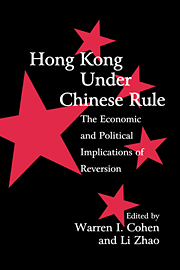Book contents
- Frontmatter
- Contents
- List of Contributors
- Introduction
- 1 Hong Kong as an International Commercial Center
- 2 Cooking the Rice without Cooking the Goose: The Rule of Law, the Battle over Business, and the Quest for Prosperity in Hong Kong after 1997
- 3 Hong Kong Faces 1997: Legal and Constitutional Issues
- 4 The Economic and Political Integration of Hong Kong: Implications for Government–Business Relations
- 5 Hong Kong and Greater China: An Economic Perspective
- 6 One Country, Two Currencies: Monetary Relations between Hong Kong and China
- 7 Political Participation in Hong Kong: Trends in the Mid-1990s
- 8 Strategic and Military Implications of Hong Kong Reversion
- 9 Hong Kong and China's Integration into the International Community
- 10 Hong Kong as a Problem in Chinese–American Relations
- 11 Post–July 1997 Challenges
- Index
7 - Political Participation in Hong Kong: Trends in the Mid-1990s
Published online by Cambridge University Press: 22 March 2010
- Frontmatter
- Contents
- List of Contributors
- Introduction
- 1 Hong Kong as an International Commercial Center
- 2 Cooking the Rice without Cooking the Goose: The Rule of Law, the Battle over Business, and the Quest for Prosperity in Hong Kong after 1997
- 3 Hong Kong Faces 1997: Legal and Constitutional Issues
- 4 The Economic and Political Integration of Hong Kong: Implications for Government–Business Relations
- 5 Hong Kong and Greater China: An Economic Perspective
- 6 One Country, Two Currencies: Monetary Relations between Hong Kong and China
- 7 Political Participation in Hong Kong: Trends in the Mid-1990s
- 8 Strategic and Military Implications of Hong Kong Reversion
- 9 Hong Kong and China's Integration into the International Community
- 10 Hong Kong as a Problem in Chinese–American Relations
- 11 Post–July 1997 Challenges
- Index
Summary
IN this chapter “political participation” refers to any act on the part of the people of Hong Kong to influence policy making in the territory. The author conducted a series of in-depth interviews in the second half of 1995. The hundred or so interviewees included senior government officials; political party leaders; members of the Legislative Council, Urban/Regional Council, and District Boards; leaders of various types of interest groups and grassroots organizations; some members of the Preliminary Working Committee (PWC) of the Preparatory Committee for the Hong Kong Special Administrative Region (HKSAR), Hong Kong Affairs Advisors, and District Affairs Advisors; executives and journalists of the territory's media; and a few academics interested in the subject. A follow-up series of in-depth interviews was conducted in the third quarter of 1996 to update the information and analysis. It covered about one quarter of those interviewed earlier.
The purpose of this research project is to study the political mood of the people of Hong Kong, including how they attempt to articulate their interests, how they assess the performance of the British administration, the political parties, interest groups, and grassroots organizations, and how they define and exercise their options in protecting and promoting their interests. No attempt has been made to quantify the findings of the interviews, although quantitative analysis will be the likely objective in a later stage of the project. Wherever it is possible and relevant, available opinion surveys are used.
- Type
- Chapter
- Information
- Hong Kong under Chinese RuleThe Economic and Political Implications of Reversion, pp. 155 - 183Publisher: Cambridge University PressPrint publication year: 1997



